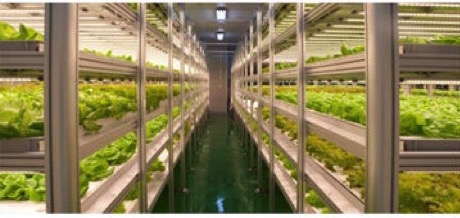
A possible solution to food insecurity could be closer to home than we may think. This concept was highlighted at the recent Agricultural Bioscience International Conference (ABIC), in Winnipeg, Manitoba, by a panel of collaborators representing the Plant Factory a vertical farm hydroponic system developed for the Opaskwayak Cree First Nations people (OCN).
The Plant Factory concept was initiated from an unlikely meeting several years ago between Cree hunters and a carload of Korean businessmen who were stuck in the mud near The Pas, Manitoba. The hunters helped pull the car out of the muck, and the Koreans, who had been surveying a potential hydroelectric project, began to think of ways to return the favor. A discussion of the OCN’s lack of accessibility to fresh fruits and vegetables led to the collaboration. South Korea is a leader in vertical farming, a technology that could help address food insecurity. Plant Factory was created within The Pas as a specialized indoor farm of 1000 square feet using a high tech LED lighting system to produce fruits and vegetables in half the time it would take for an outdoor garden and at a fraction of the cost of a conventional greenhouse. The OCN and South Korean collaborators are currently seeking to expand on this project through funding from both Korean and Canadian governments.

But the story doesn t end there. Many requests for vertical farms have now been made by other Northern communities, such as the Inuit. The smart-farm technology could be applied in developing countries as well.
The First Nations peoples of Northern Canada suffer higher levels of chronic diseases such as diabetes, and shorter life expectancies than the rest of the population. Better nutrition could be part of the solution to their health problems. With 49 percent of the OCN community suffering from type II diabetes, it seemed time for measures to be taken to ensure year-round access to a wide variety of affordable and nutrient-dense fruits and vegetables. Fresh produce is often unavailable in the North because it’s difficult to grow these crops in such a harsh environment and expensive to transport them in from the south.
The alliance of these groups offers a new model for generating nutrient-dense produce that could be extended to other rural communities across the world. It takes just a little imagination to envision Plant Factories setting up shop in other communities that are challenged with limited access to affordable and nutritious fruits and vegetables. The Plant Factory business model provides value to the lives of the OCN and reminds us that access to fresh produce can be a problem for communities of all sorts.
Kathleen Hefferon has been working as a Postdoctoral Research Fellow at the Department of Food Sciences at Cornell University and is a member of the Alliance for Science. She currently teaches at the University of Toronto and is the 2018 Fulbright Canada Research Chair for Global Food Security.
